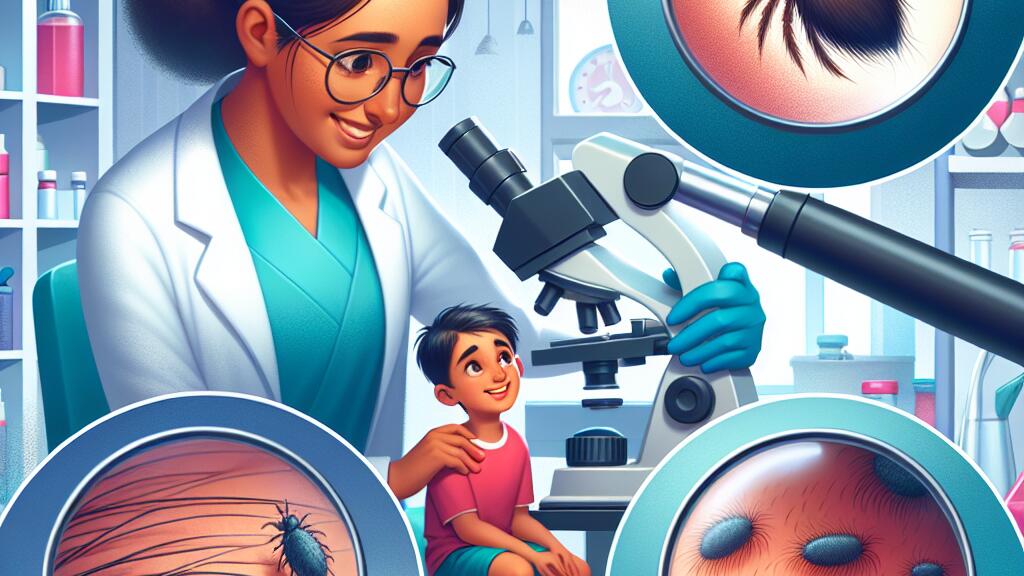Lice Clinics Treatment Advice

Lice clinic advice: What should I do if my child has head lice?
When discovering lice on your child, it is essential to stay calm and take prompt action and contact lice clinics. Begin by thoroughly checking all family members for lice and nits to prevent the spread. It's crucial to inform your child's school or daycare so that other parents can also check their children for head lice at a lice clinic. Next, wash all bedding, hats, and clothing in hot water and have your child avoid close head-to-head contact with others until the lice infestation is cleared.
After confirming the presence, consider using a lice clinic, over-the-counter or prescribed lice treatment following the instructions carefully. These lice clinic treatments can come in the form of shampoos, creams, or lotions that need to be applied to the hair and scalp. Additionally, using a fine-toothed comb to remove dead lice and nits after treatment can aid in eradicating the infestation completely. Be sure to repeat the lice clinic treatment as necessary and continue to check for any signs of remaining lice or eggs to prevent a recurrence.
Steps to take when dealing with head lice clinic in children
When dealing with head lice clinic in children, the first step is to confirm the presence of lice through careful inspection of the scalp. Check for live lice, nits (lice eggs), and itching, which are common signs. If lice are detected, it is essential to inform anyone who may have come in close contact with the infested individual to prevent further spread. and get checked at a lice clinic Additionally, it is crucial to educate your child about not sharing personal items like combs, hats, or brushes to avoid reinfestation.
Next, it is important to treat lice clinic promptly using appropriate over-the-counter or prescription medications specifically designed to eliminate lice. Follow the instructions on the product carefully and ensure that all infested individuals in the household are treated simultaneously to prevent reinfestation. After lice clinics treatment, carefully comb through the hair with a fine-toothed comb to remove dead lice and nits. Lastly, wash all bedding, clothing, and personal items in hot water and dry them on high heat to kill any remaining lice or eggs.
How can lice clinic prevent lice?
To prevent lice infestations, there are several proactive measures that can be taken. First and foremost, it is essential to educate children about the importance of not sharing personal items such as hats, hairbrushes, and hair accessories with their peers. Encouraging kids to understand the risks associated with these behaviors can significantly reduce the likelihood of lice spreading among them.
Another key prevention strategy is to regularly check your child's scalp for any signs of lice or nits. By conducting routine lice clinic inspections, you can catch any infestations early on and take swift action to prevent them from spreading further. Additionally, teaching children to avoid head-to-head contact during playtime can be beneficial in reducing the risk of lice transmission. By incorporating these simple yet effective lice clinic preventative measures into your child's routine, you can help safeguard them against the inconvenience and discomfort of dealing with head lice.
Lice Clinic tips for avoiding head lice infestations
To prevent head lice infestations, it is essential to educate children about not sharing personal items like hats, hairbrushes, or headphones with others. Stress the importance of avoiding close head-to-head contact during playtime or while engaging in group activities. Regularly remind children to keep their belongings separate and not to exchange items that come into close contact with the hair to minimize the risk of lice spreading.
Encourage children to tie their hair in ponytails, braids, or buns to reduce the chance of lice transferring from one person to another. This simple practice can act as a protective measure, especially in environments where children are in close proximity, such as schools or playgrounds. Additionally, regularly lice clinic checking your child's scalp for any signs of lice or nits can help detect infestations early and prevent them from spreading to others. By promoting these habits, parents and caregivers can actively participate in preventing head lice outbreaks among children.
Lice Clinic FAQS
What should I do if my child has head lice?
If you discover that your child has head lice, it is important to stay calm and take action promptly. Contact a head lice clinic for professional advice and treatment options. Avoid using over-the-counter lice treatments without consulting a healthcare provider first.
Steps to take when dealing with head lice in children
When dealing with head lice in children, start by thoroughly checking the scalp for lice and nits. Notify your child's school or daycare to prevent the spread of lice. Wash all bedding, clothing, and personal items in hot water and vacuum the house to remove any lice or eggs.
How can head lice be prevented?
Head lice can be prevented by avoiding head-to-head contact with individuals who have lice. Encourage children not to share hats, brushes, or hair accessories. Teach children to avoid using items that may have come into contact with lice-infested individuals.
Tips for avoiding head lice infestations
To avoid head lice infestations, regularly check your child's scalp for signs of lice or nits. Tie long hair back to reduce the risk of lice transmission. Educate your child about the importance of not sharing personal items that may harbor lice. Consider using preventive lice-repellent products as an added measure of protection.
Can head lice be transmitted through pets?
No, head lice are specific to humans and cannot be transmitted through pets. Pets cannot harbor or spread head lice, so there is no need to treat pets if a family member has head lice. Focus on treating and preventing head lice infestations among human family members.